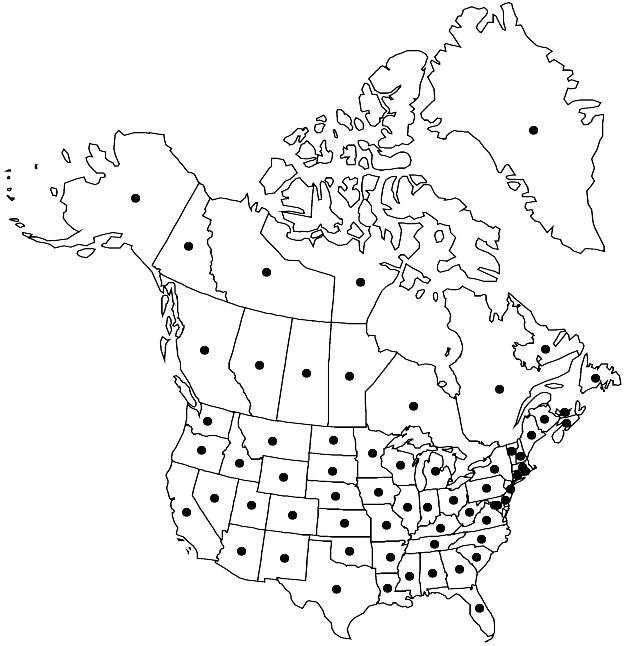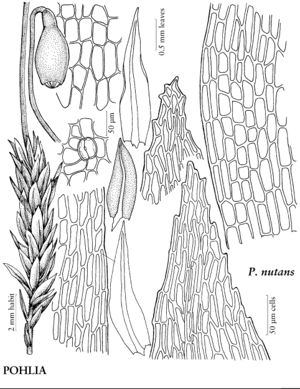Pohlia nutans
Musc. Scand., 18. 1879.
Plants small to large, green or rarely reddish, dull. Stems 0.5–3.5 (–10) cm. Leaves erect to ± spreading, lanceolate to ovatelanceolate, 2 mm; base not or scarcely decurrent; margins subentire or more often serrulate to serrate in distal 1/3; costa subpercurrent, percurrent, or rarely short-excurrent; distal medial laminal cells hexagonal to rhomboidal, firm, 50–90 µm, walls moderately thick. Specialized asexual reproduction typically absent. Sexual condition paroicous, rarely dioicous; perigonial leaves ovatelanceolate; perichaetial leaves somewhat differentiated, ± long-lanceolate. Seta orange to orangebrown. Capsule inclined 80–100°, orange to orangebrown, slender-pyriform, neck 1/2 urn length; exothecial cells elongate-rectangular, walls straight; stomata superficial; annulus present; operculum conic; exostome teeth yellow to orangebrown, acute-triangular; endostome hyaline or rarely orangebrown, basal membrane 1/2 exostome length, segments tapered apically, broadly keeled, broadly perforate, cilia short to long. Spores 16–22 µm, finely to distinctly roughened.
Phenology: Capsules mature spring (Apr–Jun).
Habitat: Soil banks, logs, tree bases, disturbed places
Elevation: low to high elevations
Distribution

Greenland, Alta., B.C., Man., N.B., Nfld. and Labr., N.W.T., N.S., Nunavut, Ont., P.E.I., Que., Sask., Yukon, Ala., Alaska, Ariz., Ark., Calif., Colo., Conn., Del., D.C., Fla., Ga., Idaho, Ill., Ind., Iowa, Kans., Ky., La., Maine, Md., Mass., Mich., Minn., Miss., Mo., Mont., Nebr., Nev., N.H., N.J., N.Mex., N.Y., N.C., N.Dak., Ohio, Okla., Oreg., Pa., R.I., S.C., S.Dak., Tenn., Tex., Utah, Vt., Va., Wash., W.Va., Wis., Wyo., Mexico (Nuevo León), Eurasia, Africa, Australia
Discussion
Pohlia nutans is the most common species of Pohlia in North America, Europe, and elsewhere in the Northern Hemisphere. In contrast to the treatment by A. J. Shaw (1982), P. sphagnicola is not separated here from P. nutans; the type of P. sphagnicola is European. Plants referable to P. sphagnicola, including North American collections, differ in being dioicous and having entire leaves, slightly shorter laminal cells, and smaller spores. The habitat in Sphagnum hummocks is not diagnostic; at least 80% of plants growing in Sphagnum are P. nutans. Pohlia schimperi, a northern form with reddish leaves, also dioicous, is not recognized, as per Shaw.
The peristome of Pohlia nutans is as well developed as any in Pohlia, with long, tapered, trabeculate exostome teeth and well-developed endostomes with broadly keeled, widely perforate segments and short to long cilia. The laminal cells are short- to elongate-hexagonal with thickened walls. The only other North American species with relatively thick-walled laminal cells is P. elongata; the cells of P. elongata are typically longer, but there is extensive overlap in sizes. Plants without sporophytes have generally been named P. nutans, although some collections from montane regions may actually be P. elongata; sporophytes of P. elongata have longer necks, as long as or longer than the urns, and reduced peristomes with endostome segments narrowly split along the keel and (usually) no cilia.
Selected References
None.
Lower Taxa
"tapered" is not a number."narrow" is not a number.
